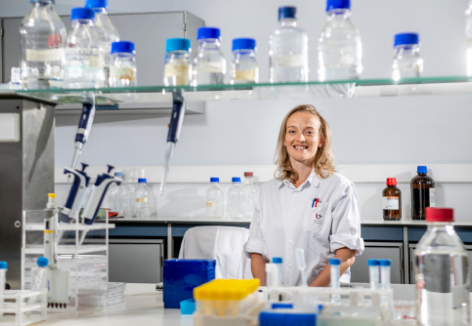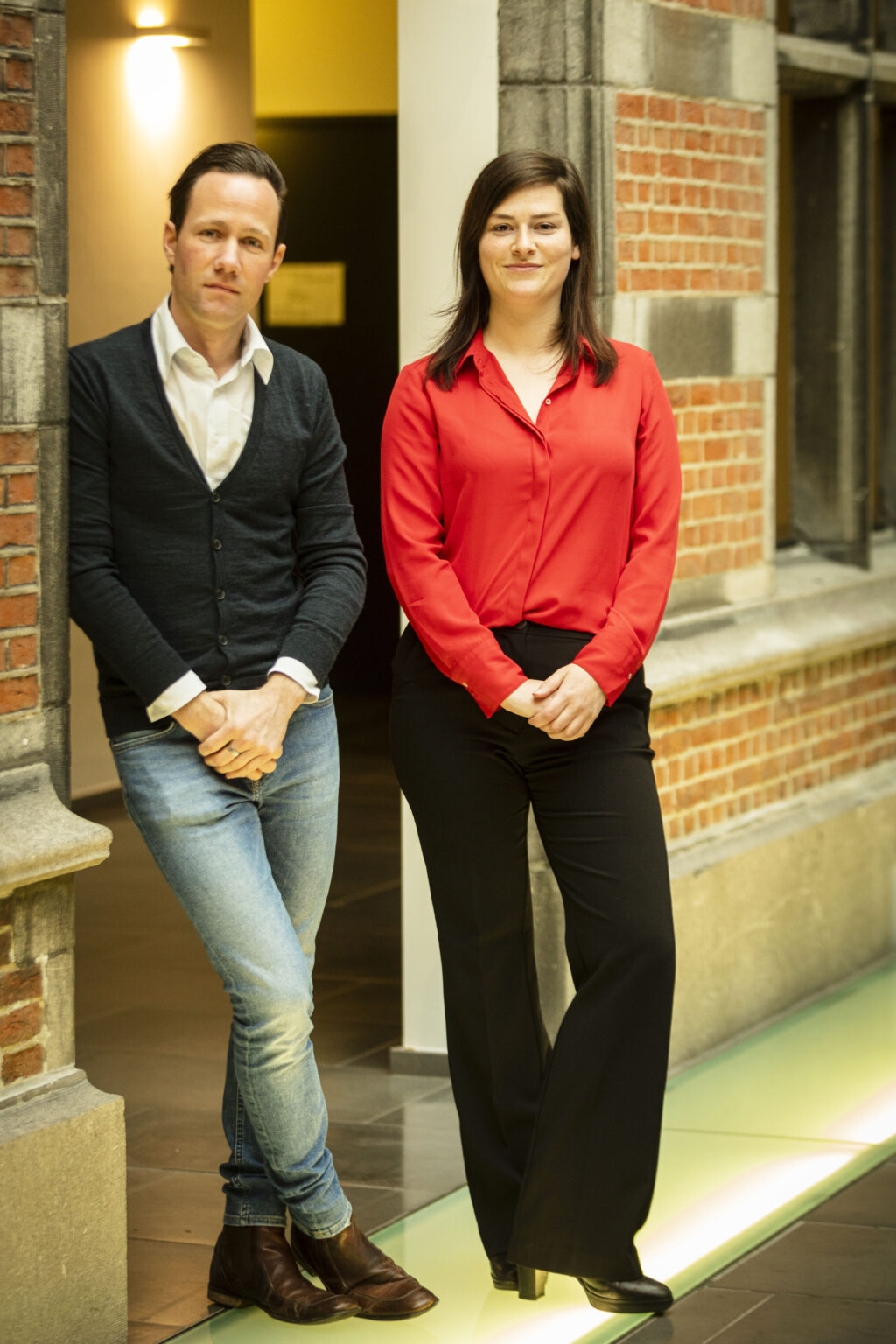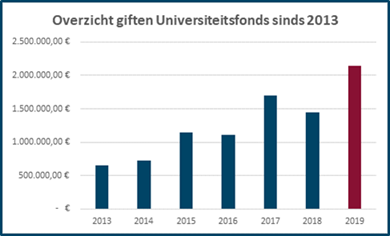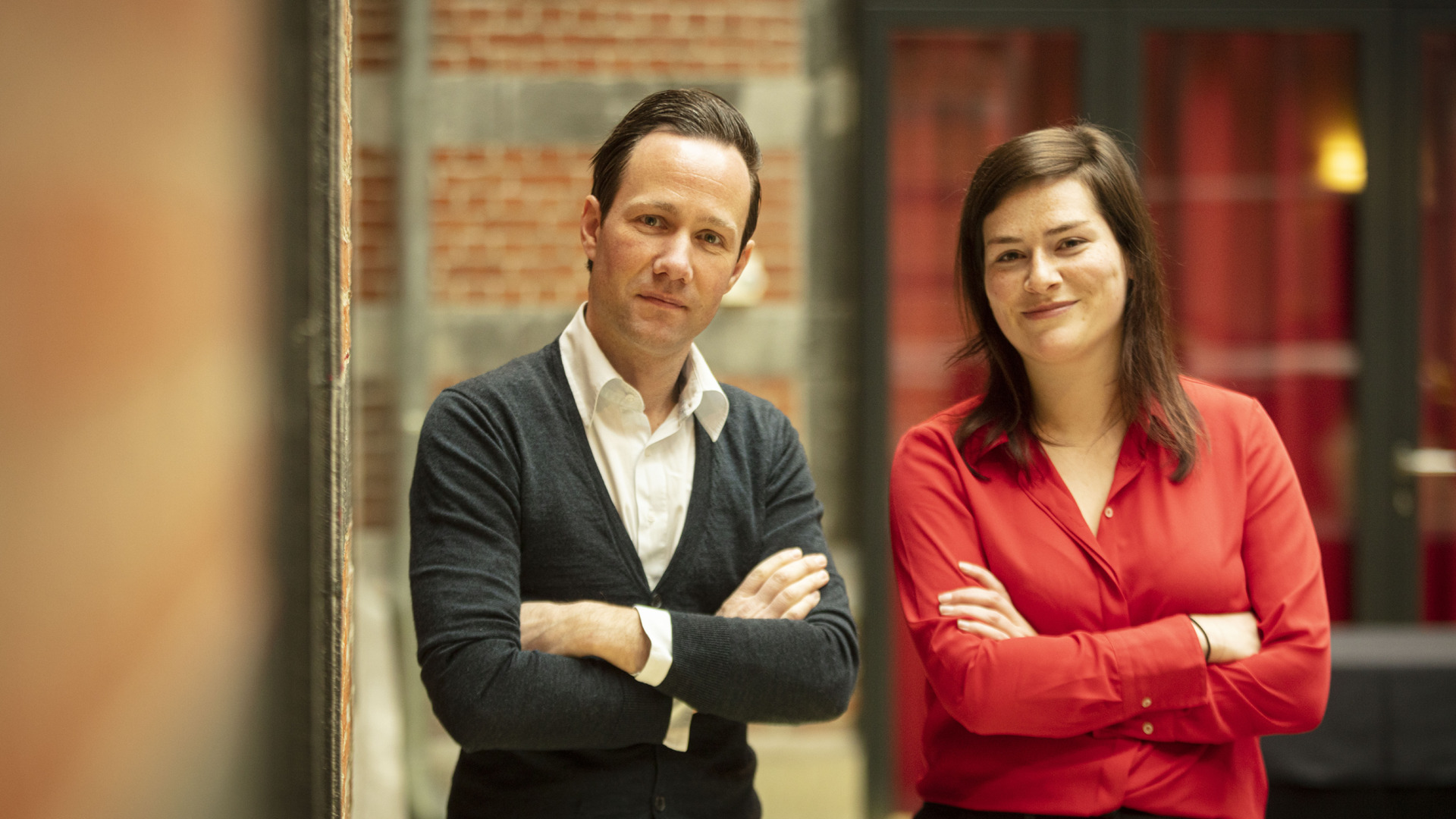Last year, our university received more than 2 million euros in donations for the first time. This was a great boost for the University of Antwerp Fund. “Still, that figure is not our main goal. More than anything, we want to put UAntwerp on the map as a good cause”, says Dimitry Beuckelaers, who has teamed up with Nickie Maes as the new tandem behind the Fund.
When you talk to people about UNICEF or Kom op tegen Kanker (Stand Up To Cancer Foundation), they immediately think about donations. “The fact that our university is also a good cause is much less well known”, says Dimitry Beuckelaers, coordinator of the University of Antwerp Fund, which is part of the University and Community Department. “Many people don’t realise that we have an important societal role. Think cancer research, air quality, the fight against poverty, and so on. However, as the resources we receive from the government are becoming increasingly scarce, such projects are only possible with the help of donations and bequests. The University of Antwerp Fund is the driving force behind that patronage.”
Dimitry Beuckelaers and Nickie Maes were recruited in 2019 to give the University of Antwerp Fund a new boost. They found that the Fund’s activities both inside and outside the university were still not very well known. One of the first challenges was therefore to develop an awareness campaign, which centred around the theme Care about tomorrow today. This campaign, which was set up in collaboration with the Communications Department, was the first one to be launched since the Fund’s foundation in 2012. The website was freshened up, the Fund got its own Facebook and LinkedIn pages, and a newsletter was introduced.
Five ambassadors
“Because you can’t capture the University of Antwerp Fund in one image, we’re working with five ambassadors, each addressing a specific target group”, Nickie continues. “Those are testators, private individuals, service clubs, entrepreneurs and our own staff. One of the ambassadors is Jo Van Moer, CEO of Van Moer Logistics and entrepreneur of the year in 2019. He founded a chair within the Faculty of Business and Economics. There’s also an Antwerp teacher and alumnus who included our university in his will, a private donor who regularly donates to cancer research and two ladies who support UAntwerp through their service club Zonta Antwerpen.” “These are all people we’ve already worked with and who are happy to support the campaign”, says Dimitry.
UAntwerp’s own ambassador is Professor Evelien Smits of the Centre for Oncological Research, also the chair of the University of Antwerp Fund’s Steering Committee. She regularly makes use of the Fund’s services herself. “When I receive a donation, they send a thank-you card and a Christmas card to the donor, they take care of the tax certificate, make sure that the donation reaches the right person, and so on. They’ve also helped us organise a guided tour of our laboratory for our donors. And now that I’m the second supervisor of a chair, they helped us set it up.”

The importance of donations and bequests is also difficult to overestimate in cancer research, Evelien confirms. “We mainly work on a project basis, but we often have to wait a long time for funding to be granted. You also need to be able to bridge the periods between projects. Without that extra financial support, you’d have to let talented staff members go when the project is over. The search for extra funding takes up a big chunk of my time, so I’m very grateful that the University of Antwerp Fund takes this work off my hands.”
“Every gift matters”
If you’re approached by a patron yourself or if you want to bring a specific research project to the attention of the public, it’s worth including the University of Antwerp Fund in the process right from the start. Dimitry: “We provide administrative and legal support and can help with communication and marketing, or even with organising events.” Of course, the faculties themselves do a very good job with this as well. “In that sense, our role is complementary: it’s not a question of one or the other”, Dimitry stresses.

Not surprisingly, most donations go to the Faculty of Medicine and Health Sciences, for example to support cancer research. “People are more likely to donate to causes that affect them personally”, explains Dimitry. In 2019, around 91% of donations came from the business world. Nevertheless, donations from private individuals, however modest, are also more than welcome. Dimitry: “If we receive a donation without a preferred use, we always try to contact that person to find out what he or she would like the money to be spent on. Even if it’s just a small donation, every gift is important to us. We also keep people informed about what has happened to their contribution, so they know that it did have an impact. That’s how we try to build a loyal community of committed donors.”
Coronavirus spoils the fun (but only for a while)
Due to the corona crisis, the Care about tomorrow today campaign was launched six months later than planned. “In March, donations came to a complete standstill”, Dimitry says. “We then started focusing on corona research projects, such as the analysis of blood samples under the supervision of Professor Pierre Van Damme. We were able to raise more than 600,000 euros in total for those projects.”
Seeing the number of donations rise by half in 2019 and the number of chairs leap from 12 to 23 in just one year shows that the efforts are paying off. For this year, Dimitry and Nickie expect an even stronger increase. “Still, we don’t want to obsess over those numbers. Creating awareness and putting our university on the map as a good cause is more important in the long term”, Dimitry concludes.

Want to know more? Go to www.universiteitsfonds.be or subscribe to the University of Antwerp Fund newsletter.
Follow the University of Antwerp Fund on social media:
Did you know that donations of 40 euros or more that are made in 2020 are 60% deductible instead of the usual 45%? In other words, if you donate 50 euros, you get 30 euros back.


